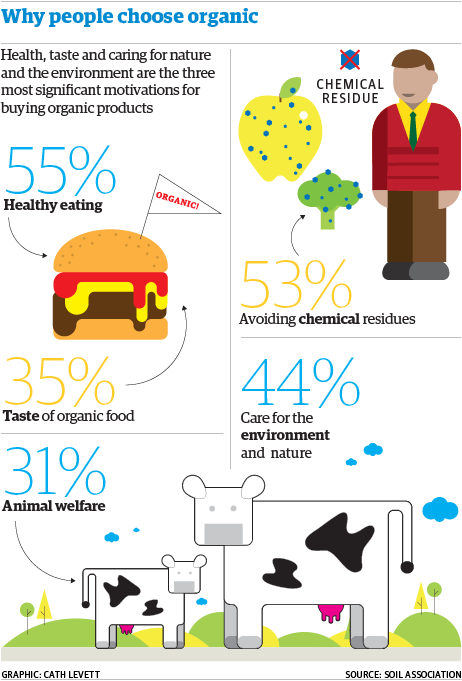
As I posted in The Rabbit Hole the other day, there are a number of studies about organic food coming out these days, some of which are focused on whether or not organically-raised foods are nutritionally better for you. Industrial agriculture is clearly getting worried about public perception, because they are forming astroturf groups (groups that look like they're grassroots, but are actually funded and directed by industry) as part of their push-back against alternatives to the industrial food system. It is an expected strategy now that Big Tobacco owns such a big piece of the manufactured food-like substance industry.
Well, sure as the "super moon" has arrived, so has another study made it into the media. The Guardian has reported on one in an article titled "Clear differences between organic and non-organic food, study finds." The article begins:
Organic food has more of the antioxidant compounds linked to better health than regular food, and lower levels of toxic metals and pesticides, according to the most comprehensive scientific analysis to date.The study cited is Higher antioxidant and lower cadmium concentrations and lower incidence of pesticide residues in organically grown crops: a systematic literature review and meta-analyses. There's a lot of what Stepghen Stills called "hooray for our side" going on. The British Soil Association cheers the report for showing that "this research [...] shatters the myth that how we farm does not affect the quality of the food we eat."
The international team behind the work suggests that switching to organic fruit and vegetables could give the same benefits as adding one or two portions of the recommended "five a day".
Of course, there is an opposing viewpoint: Tom Sanders, a professor of nutrition at King's College London said "he was not persuaded by the new work. "You are not going to be better nourished if you eat organic food," he said. "What is most important is what you eat, not whether it's organic or conventional. It's whether you eat fruit and vegetables at all. People are buying into a lifestyle system. They get an assurance it is not being grown with chemicals and is not grown by big business."
So the question of whether organically grown food is nutritionally better for you is still not a solved puzzle. Mostly because nutrition is not a solved puzzle. Despite all the research being produced and released, and commented on by and in the media, we still have no really good idea about what any of the research means. Because double-blind human trials would be unethical, we will probably never definitively know what any of this research does and doesn't mean.
The Guardian, to its credit, does try to address this in a piece by Karl Mathiesen titled Will eating organic food make you healthier? After some back-and-forthing with various studies, claims and counter-claims, there is actually a follow-up interview with one of the study's lead authors, Carlo Leifert where he gets to respond to some of the claims and criticisms around the study. Some of the criticisms and his responses?
Cadmium variation usually results from soil variation:Mathiesen's article is noteworthy for taking a lot of the politics out, and adding a fair bit of the science back in to the whole "is organic better" argument. There's also a link to a great reproduction of an old article called The Organic Movement by Colin Mares (?), which shows that some of these arguments go back decades.
"We are pretty certain that soil type is averaged out over the many studies [we analysed]."Higher cadmium levels in conventional crops are still within safe legal limits:
"But cadmium accumulates in the body - you really want to avoid eating it if possible."Pesticides levels is conventional foods are also beneath maximum recommended levels:
"But there are some conventional crops that do exceed levels (eg 6% of spinach - see paper for more examples). If you want to avoid that it would be helpful to eat food with a lower chance of pesticides. until they start testing combinations of pesticide I am not confident in the regulatory testing regime."
UPDATE:
Another excellent piece by Nathanael Johnson at Grist on the controversy ( can it really be a controversy when both sides are arguing from positions of scientific uncertainty?).
But what we do know is clear: organic food exposes us to fewer pesticides and herbicides and is better for the soil. And that Industrial Organic is not the same as Sustainable Organic. So buy local organic when you can, and plant a garden (or a plot, or a balcony, or a pot in the window).
No comments:
Post a Comment